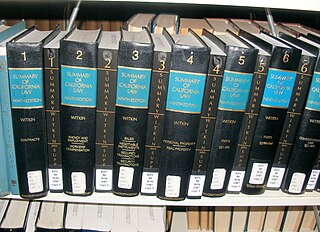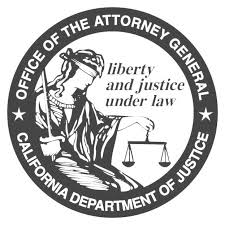Freedom of information laws allow access by the general public to data held by national governments. The emergence of freedom of information legislation was a response to increasing dissatisfaction with the secrecy surrounding government policy development and decision making. They establish a "right-to-know" legal process by which requests may be made for government-held information, to be received freely or at minimal cost, barring standard exceptions. Also variously referred to as open records, or sunshine laws, governments are typically bound by a duty to publish and promote openness. In many countries there are constitutional guarantees for the right of access to information, but these are usually unused if specific support legislation does not exist.

Proposition 22 was a law enacted by California voters in March 2000 to prevent marriage between same-sex couples. In May 2008, it was struck down by the California Supreme Court as contrary to the state constitution.
First National Bank of Boston v. Bellotti, 435 U.S. 765 (1978), is a U.S. constitutional law case which defined the free speech right of corporations for the first time. The United States Supreme Court held that corporations have a First Amendment right to make contributions to ballot initiative campaigns. The ruling came in response to a Massachusetts law that prohibited corporate donations in ballot initiatives unless the corporation's interests were directly involved.
Statutory interpretation is the process by which courts interpret and apply legislation. Some amount of interpretation is often necessary when a case involves a statute. Sometimes the words of a statute have a plain and straightforward meaning. But in many cases, there is some ambiguity or vagueness in the words of the statute that must be resolved by the judge. To find the meanings of statutes, judges use various tools and methods of statutory interpretation, including traditional canons of statutory interpretation, legislative history, and purpose. In common law jurisdictions, the judiciary may apply rules of statutory interpretation both to legislation enacted by the legislature and to delegated legislation such as administrative agency regulations.
Stromberg v. California, 283 U.S. 359 (1931), was a United States Supreme Court case in which the Court ruled 7–2 that a 1919 California statute banning red flags was unconstitutional because it violated the First and Fourteenth Amendments to the United States Constitution. This decision is considered a landmark in the history of First Amendment constitutional law, as it was one of the first cases where the Court extended the Fourteenth Amendment to include a protection of the substance of the First Amendment, in this case symbolic speech or "expressive conduct", from state infringement.
Public records are documents or pieces of information that are not considered confidential and generally pertain to the conduct of government.
Whalen v. Roe, 429 U.S. 589 (1977), was a case brought before the Supreme Court of the United States. The case involved a New York state law requiring reporting and storage of information concerning all Schedule II drug prescriptions. Physicians were required to report the name of the prescribing physician; the dispensing pharmacy; the drug and dosage; and the name, address, and age of the patient. This information was then stored by the New York Department of State.

Proposition 218 was an adopted initiative constitutional amendment which revolutionized local and regional government finance in California. Called the "Right to Vote on Taxes Act," it was sponsored by the Howard Jarvis Taxpayers Association as a constitutional follow-up to the landmark property tax reduction initiative constitutional amendment, Proposition 13, approved in 1978.

Ballot Measure 2 of 1998 is a ballot measure, since ruled unconstitutional, that added an amendment to the Alaska Constitution that prohibited the recognition of same-sex marriage in Alaska. The Ballot measure was sparked by the lawsuit filed by Jay Brause and Gene Dugan, after the two men were denied a marriage license by the Alaska Bureau of Vital Statistics. In Brause v. Bureau of Vital Statistics, 1998 WL 88743, the Alaska Superior Court ruled that the state needed compelling reason to deny marriage licenses to same-sex couples and ordered a trial on the question. In response, the Alaska Legislature immediately proposed and passed Resolution 42, which became what is now known as Ballot Measure 2. Ballot Measure 2 passed via public referendum on November 3, 1998, with 68% of voters supporting and 32% opposing. The Bause case was dismissed following the passage of the ballot measure.

The law of California consists of several levels, including constitutional, statutory, and regulatory law, as well as case law. The California Codes form the general statutory law.

Arizona Proposition 102 was an amendment to the constitution of the state of Arizona adopted by a ballot measure held in 2008. It added Article 30 of the Arizona Constitution, which says: "Only a union of one man and one woman shall be valid or recognized as a marriage in this state." The amendment added a constitutional ban on same-sex marriage to existing statutory bans in place since 1996. In October 2014, Article 30 of the Arizona Constitution was struck down as unconstitutional in the United States District Court for the District of Arizona, and is no longer enforced by the state of Arizona, which now allows and recognizes same-sex marriages.
Cox Broadcasting Corp. v. Cohn, 420 U.S. 469 (1975), was a United States Supreme Court case involving freedom of the press publishing public information. The Court held that both a Georgia Statute prohibiting the release of a rape victim's name and its common-law privacy action counterpart were unconstitutional. The case was argued on November 11, 1974 and decided on March 3, 1975.
The California Public Records Act was a law passed by the California State Legislature and signed by the governor in 1968 requiring inspection or disclosure of governmental records to the public upon request, unless exempted by law.
Freedom of information in California is controlled by Constitutional, legislative, and judicial rules.
The copyright status of works produced by the governments of states, territories, and municipalities in the United States varies. Copyright law is federal in the United States. Federal law expressly denies U.S. copyright protection to two types of government works: works of the U.S. federal government itself, and all edicts of any government regardless of level or whether or not foreign. Other than addressing these "edicts of government", U.S. federal law does not address copyrights of U.S. state and local government.

Lofton v. Secretary of the Department of Children & Family Services, is a decision from the United States Court of Appeals for the Eleventh Circuit upholding Florida's ban of adoption of children by homosexual persons as enforced by the Florida Department of Children and Families.
Offering citizens access to state-held information is "one of the most effective ways of upholding the constitutional values of transparency, openness, participation and accountability." Currie and De Waal suggest that accountability is unattainable if the government has a monopoly on the information that informs its actions and decisions. Access to information is not only fundamental to a properly-functioning participatory democracy; it also increases public confidence in government and enhances its legitimacy. There are also, according to Cora Hoexter,
many other benefits to be had. For instance, access to information discourages corruption, arbitrariness and other improper governmental conduct. It facilitates the protection of rights, something that is easily demonstrated in the area of administrative justice. Like reasons for administrative action, access to state-held information can be of enormous assistance to a person who suspects that her rights to administrative justice have been infringed and is in the process of building a case.












